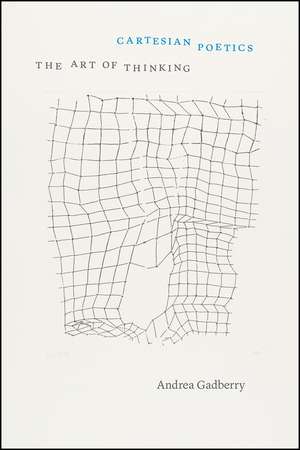Cartesian Poetics: The Art of Thinking: Thinking Literature
Autor Andrea Gadberryen Limba Engleză Paperback – 20 oct 2020
Gadberry’s approach to seventeenth-century writings poses questions urgent for the twenty-first. Bringing literature and philosophy into rich dialogue, Gadberry centers close reading as a method uniquely equipped to manage skepticism, tolerate critical ambivalence, and detect feeling in philosophy. Helping us read classic moments of philosophical argumentation in a new light, this elegant study also expands outward to redefine thinking in light of its poetic formations.
| Toate formatele și edițiile | Preț | Express |
|---|---|---|
| Paperback (1) | 183.83 lei 3-5 săpt. | +10.80 lei 6-10 zile |
| University of Chicago Press – 20 oct 2020 | 183.83 lei 3-5 săpt. | +10.80 lei 6-10 zile |
| Hardback (1) | 671.97 lei 6-8 săpt. | |
| University of Chicago Press – 20 oct 2020 | 671.97 lei 6-8 săpt. |
Preț: 183.83 lei
Nou
Puncte Express: 276
Preț estimativ în valută:
35.18€ • 38.20$ • 29.55£
35.18€ • 38.20$ • 29.55£
Carte disponibilă
Livrare economică 02-16 aprilie
Livrare express 18-22 martie pentru 20.79 lei
Preluare comenzi: 021 569.72.76
Specificații
ISBN-13: 9780226723020
ISBN-10: 022672302X
Pagini: 224
Dimensiuni: 152 x 229 x 15 mm
Greutate: 0.28 kg
Ediția:First Edition
Editura: University of Chicago Press
Colecția University of Chicago Press
Seria Thinking Literature
ISBN-10: 022672302X
Pagini: 224
Dimensiuni: 152 x 229 x 15 mm
Greutate: 0.28 kg
Ediția:First Edition
Editura: University of Chicago Press
Colecția University of Chicago Press
Seria Thinking Literature
Notă biografică
Andrea Gadberry is assistant professor at New York University at the Gallatin School of Individualized Study and in the Department of Comparative Literature.
Cuprins
Introduction: Resultless Enterprises
Chapter One: Common-Sense Envy
Chapter Two: Lyric Disposition
Chapter Three: Bitter Satisfactions
Chapter Four: After Thoughts
Epilogue: “A Painful Feeling of Strangeness”
Chapter One: Common-Sense Envy
Chapter Two: Lyric Disposition
Chapter Three: Bitter Satisfactions
Chapter Four: After Thoughts
Epilogue: “A Painful Feeling of Strangeness”
Acknowledgments
Notes
Index
Notes
Index
Recenzii
“An intricate, gripping new book. . . There is a strangeness—an uncanniness, even—to the Descartes emerging from Gadberry’s treatment. It is a reading that is at once convincing and utterly unexpected: Descartes as upside-down, inside-out love poet. . . Cartesian Poetics is a coup all its own. It ought to change the way we read Descartes.”
"Gadberry offers a dazzling reinterpretation of Descartes’s relation to poetry. Written in beautiful and witty prose, this book argues that Cartesian philosophy is underpinned, shaped, and, in important ways, determined by the pressures and forces of literary genre: poetry is a vital form of thinking that is in no way confined to literary texts.. . . . [An] excellent and evocative book."
“Gadberry’s engaging book defends Descartes against the charge of being the evil genius of modernism. . . . What makes reading Gadberry’s book a rewarding experience is not, as one might expect, a literary deconstruction of Descartes’s text. . . It is rather the way in which, by bringing Descartes’s carefully coded feelings to light, it humanizes both the philosopher and the twists and turns of thinking as such.”
"In this brilliant book, Gadberry thinks about the poetic forms that shape Descartes’s thinking. Her close attention to form has perhaps led her to give similar consideration to the forms of academic writing, and the result is exemplary within that genre: the book is a pleasure to read. Throughout, Gadberry conducts a conversation with many of the thinkers and scholars who have thought with and against Descartes. . . . Cartesian Poetics offers a compelling new way of understanding an author whose claims—and style—remain provocative today."
“Cartesian Poetics is an original, hard-nosed, gorgeously written, and compelling book. For a book on the aesthetics of thinking, it is suitably beautiful and intelligent. . . . Gadberry’s artful reconstruction and probing of Descartes’s sentences reveal the poetry flowing beneath and within his philosophy.”
“Cartesian Poetics brilliantly integrates historical sensitivity and speculative boldness. Tracing a ‘literary life of concepts’ through the riddle, the love lyric, the elegy, and the anagram, Gadberry gives us a new history of Descartes’s philosophical coming of age. Her nuanced close readings, which make dazzling use of wit as an engine of literary-critical investigation, awaken us to a conception of poetic form that lives in and between thoughts—that makes ‘thinking,’ in the largest sense, possible.”
"Gadberry joins the chorus of recent scholars whose work rehabilitates Descartes from the role of 'the archvillain responsible for all of modernity’s worst impulses.' Cartesian Poetics sits neatly alongside other reevaluations of Cartesian philosophy that take seriously his work on the passions and virtue."














